7 Tips on How to Beat Winter Fatigue

The change from summer to winter can have a significant impact on your motivation and energy levels. After all, with winter comes cold, short days and less sun exposure. Fortunately, there are various steps you can take to minimize fatigue during the winter months. Read on to learn more about winter-related fatigue, the science behind it, and how you can overcome it.
- What Is Winter Fatigue?
- Why Am I So Tired in the Winter?
- Winter Fatigue Symptoms
- How to Beat Winter Fatigue
- Key Takeaways on How to Beat Winter Fatigue
What Is Winter Fatigue?
Winter fatigue is the feeling of excessive tiredness during the winter months. Often, it’s the result of fewer daylight hours, which can subconsciously tell your brain it’s time to start getting ready for bed even though it may still be early in the evening. Winter tiredness can also be linked to other health conditions, including Seasonal Affective Disorder (SAD) and Vitamin D deficiency.
Why Am I So Tired in the Winter?
There are various reasons why you may feel tired in the winter. The most significant culprit? The scarcity of sunlight during the day.
Much of the Northern Hemisphere receives less sunlight during the winter months due to the Earth’s axis tilting away from the sun. This seasonal change is known as the winter solstice and typically begins mid-December and lasts until springtime.
With shorter days and less daytime sun your body’s natural sleep-wake cycle is thrown out of balance. This is because your circadian rhythm, your body’s internal clock, is easily influenced by sunlight and temperature. An abrupt change of these two external cues can significantly disrupt your circadian rhythm and the release of melatonin—the hormone responsible for triggering sleep. As a result, more melatonin is produced soon after it gets dark outside, which occurs earlier in the winter.

Moreover, the less sunlight there is, the less Vitamin D you receive. Vitamin D is produced using sunlight and it plays a major role in keeping your body healthy. One study made note of the correlation between Vitamin D levels and tiredness, citing that 77.2% of patients who presented symptoms of fatigue had low Vitamin D.
Winter Fatigue Symptoms
If you’re unsure about whether or not you’re experiencing winter tiredness, here are a few common signs and symptoms of winter-related fatigue:

- Trouble sleeping
- Feelings of agitation or sluggishness
- Difficulty concentrating
- Low energy
- Tiredness or fatigue
- Oversleeping
While it’s normal to experience the symptoms above during winter, there are instances when winter fatigue can indicate other health conditions, including:
- Seasonal Affective Disorder: SAD is a mood disorder that’s most commonly associated with colder months, such as late autumn and winter, and is characterized by feelings of depression. These feelings occur every year around the same time.
- Chronic fatigue syndrome: If your lack of energy persists past the winter season, it may be a sign of chronic fatigue syndrome. A notable symptom is being unable to feel refreshed even after resting.
- Vitamin D deficiency: Due to the lack of sun during winter, you may not get enough Vitamin D, which may potentially lead to Vitamin D deficiency.
How to Beat Winter Fatigue
Winter fatigue can bring your life to a halt, hindering your ability to do the daily things you enjoy. So what can you do about it? Below you’ll find a few tips that can help you beat winter fatigue during the colder months.
1. Improve sleep hygiene
You can reduce symptoms of winter-related fatigue by improving your sleep hygiene. Having good sleep hygiene allows you to develop sleep habits that are necessary for a healthy lifestyle. A major part of healthy sleep hygiene is having a consistent sleep schedule that enables you to get seven or more hours of sleep. This also includes sleeping at a reasonable hour during the weekdays and weekends so that your body gradually adjusts to seasonal changes and it’s easier to fall asleep.
2. Get more sunlight
During winter, the days become shorter and less sunlight is available. This means that if you have a nine-to-five job, it’ll be dark out by the time you leave the office. It’s vital to get as much exposure to light as possible since sunlight affects your sleep-wake cycle. Here are a few tips, so you can get more sun when it’s winter:
- Take a walk at lunch
- Exercise outside
- Open the window shades right when you wake up
Making an effort to get more sun during the day can be extremely beneficial, as it can provide you with Vitamin D. Implementing the tips above into your routine can also delay the release of melatonin and improve symptoms of chronic fatigue in winter.
3. Exercise
Rolling out of bed or off the couch may be the last thing you want to do during the winter, but staying active and participating in physical exercise can get your blood pumping and wake you up. According to Harvard Medical School, exercising in the winter can increase the production of hormones and mitochondria to give your body a much-needed boost.
The Centers for Disease Control (CDC) recommends adults receive 150 minutes of exercise a week. If you don’t want to leave your home, whether that’s because of a pile of snow in your driveway or it’s simply too cold, consider doing a few aerobic exercises in your living room.
However, it may not be a good idea to exercise before bed. Exercising too close to your bedtime can cause you to toss and turn well into the night because it raises your alertness.
4. Create a good sleeping environment
A good sleeping environment is essential to getting the sleep you rightfully deserve. Without one, not only can you have trouble falling asleep, but you can also experience difficulty staying asleep. A few tips for creating a relaxing and healthy sleep environment include:

- Getting the right mattress: From mattresses that creak with every move to mattresses that don’t provide enough support, there’s plenty of ways that a bed can ruin your sleep. Fortunately, our selection of copper infused memory foam mattresses are designed to provide next-level comfort.
- Investing in quality bedding: We spend a significant portion of our lives in bed, so why not make it as inviting as possible? The Layla Sleep® Down Alternative Comforter is a luxurious option that can keep you both warm during cold weather and cool in the summer. Check out our comforter buying guide to find the right bedding for your lifestyle, whether you like sleeping naked or bundled-up.
- Adjusting the temperature: The best temperature for sleep falls between 60 degrees and 67 degrees Fahrenheit. Make an effort to keep your bedroom at this temperature to achieve a good night’s rest.
- Use a humidifier: If the cold, dry winter air is causing nasal congestion at night, a humidifier can clear up your stuffy nose and help you breathe better.
5. Take a nap
Sneaking in a quick nap into your schedule is a great way to freshen up and get rid of mid-day grogginess. Taking a nap can increase your alertness, giving you the energy necessary to get through the day and combat winter fatigue. Plus, there are several benefits to taking naps, including reducing stress, improving mood, and boosting memory retention.
Make sure to take naps at the right time—between noon and 3:00 pm—to prevent it from eating away your sleep at night.
6. Consume caffeine
You can consume caffeine for a quick pick-me-up whenever you start to feel sluggish in the morning or during the day. Caffeine wakes you up by stimulating your central nervous system and it can be found in coffee, carbonated beverages, energy drinks, and tea.
However, caffeine and sleep don’t always go hand-in-hand. The effects of caffeine can last up to six hours, so it’s best not to consume it close to bedtime. If you’re looking for something to drink at night, opt for a non-caffeinated beverage.
7. Eat nutritious food
Food affects your energy levels and eating nutritious foods, especially during the winter, can give you a much-needed boost of energy. While it may be tempting to reach for starchy and warm comfort food during the winter, it’s important to incorporate fruits, vegetables, and lean protein into your diet. Some foods are also packed with Vitamin D and other vital vitamins that can keep you going instead of making you crash.

Key Takeaways on How to Beat Winter Fatigue
Fatigue in the winter is a normal incident experienced by many people caused by the lack of daytime hours during the colder months. Seasonal Affective Disorder can also bring it on. While winter fatigue may seem unavoidable, there are several ways that you can beat winter fatigue including getting more sun, exercising, napping, and creating a good sleeping environment.
Fortunately, Layla Sleep has a wide selection of bedding options to help you achieve a comfortable sleeping environment fit for the winter. From our ultra-soft Down Alternative Comforter, which provides warmth without locking in heat, to the renowned Layla Weighted Blanket, we have just the thing to help you sleep at night.





